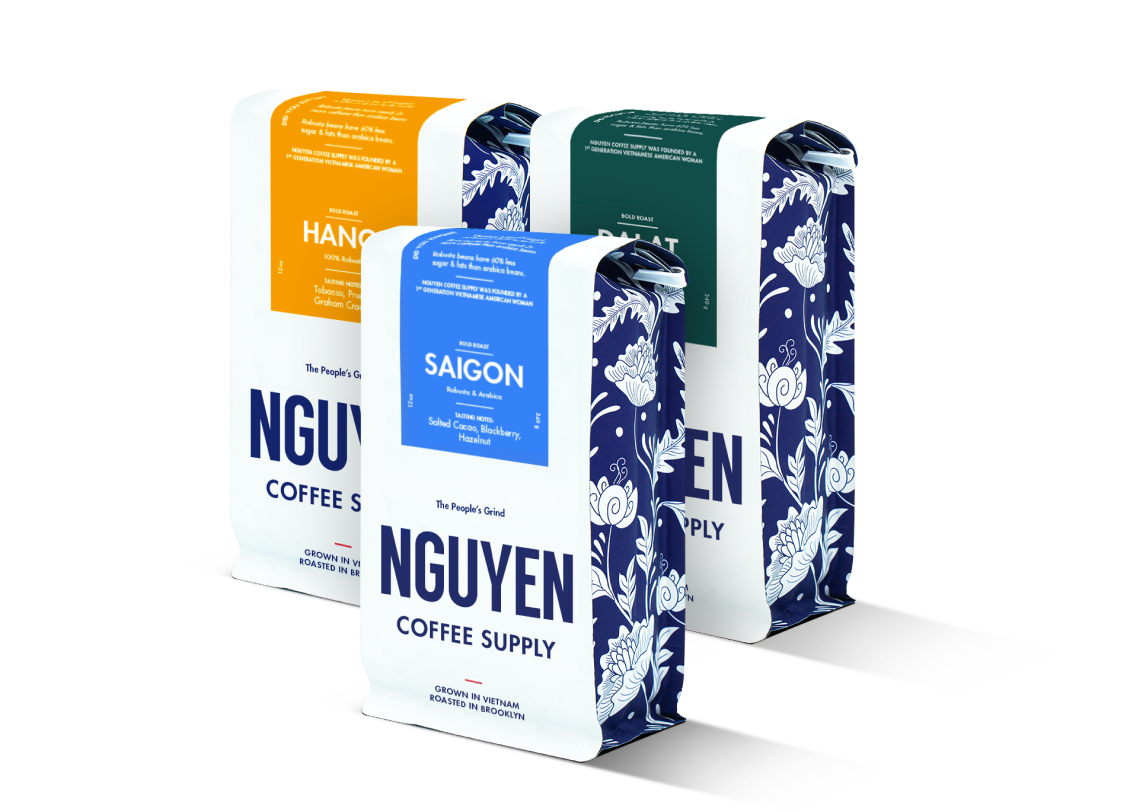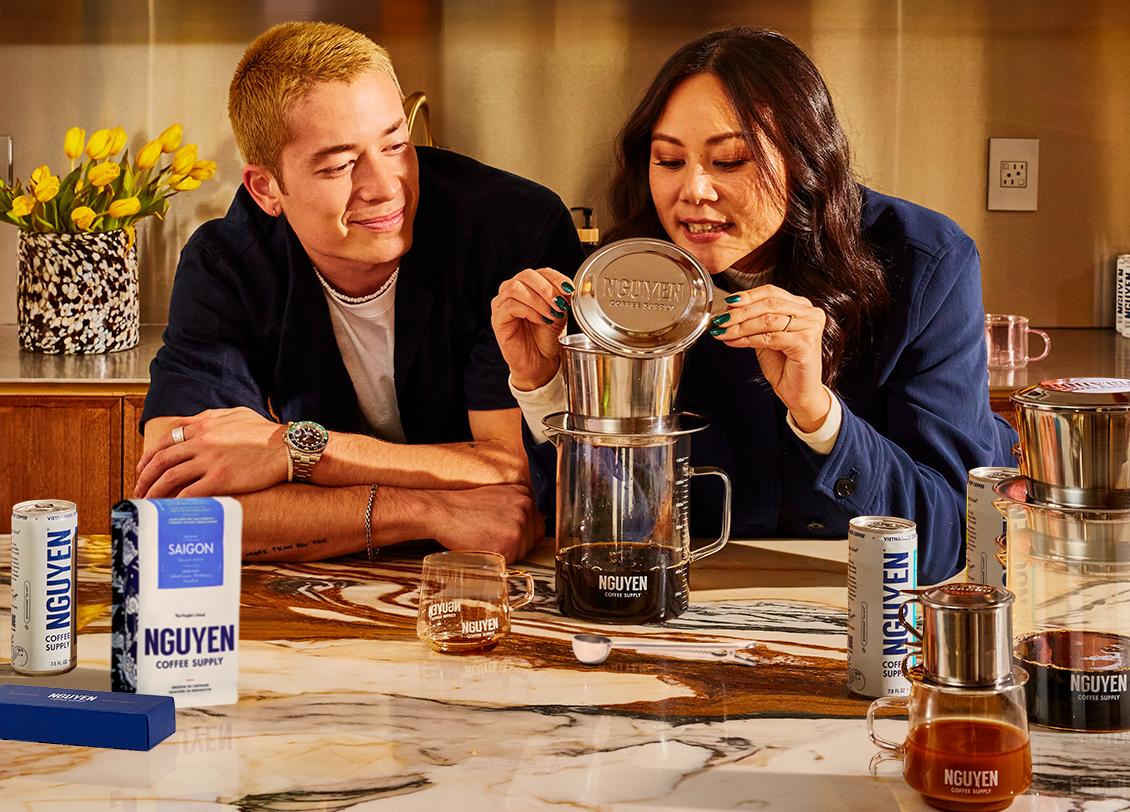

- FEATURED ON IMBIBE

Create for yourself or as a gift for your loved ones
Subscribe nowMe and mom just enjoyed the Nguyen phin drip experience. Wow. Proud of your work. We without hesitation enjoy the Vietnamese coffee and recommend your products. Thank-you to the Nguyen staff and tradition. From Canada eh!
Vietnamese coffee has grown in popularity over the years in the United States as evidenced by the rise of coffee shops serving (or marketing) Vietnamese coffee. Additionally, Vietnamese coffee shops with coffee sourced from Vietnam have opened across the country in cities such as Boston, Kansas City, Portland, and more.
If you haven’t tried Vietnamese coffee before, we think you’ll be convinced otherwise by the end of this piece. It shouldn’t come as a surprise that we love Vietnamese coffee here. And while we could go on at length as to why this is, for now we’ll run through our top 5 reasons why you should love Vietnamese coffee.
Before we dive into the reasons why Vietnamese coffee is so good that it deserves to be loved by all, we need to establish an understanding of what Vietnamese coffee actually is. In essence, Vietnamese coffee is coffee that is grown and produced in Vietnam. Vietnamese coffee is not coffee made with sweetened condensed milk– that’s merely a coffee beverage that is commonly enjoyed in Vietnam, but there are many other coffee drinks enjoyed throughout the country.
Another important defining feature of Vietnamese coffee is that it is primarily robusta coffee, a species of coffee that is widely produced throughout the country. Vietnam is the number one producer of robusta coffee in the world, and the second leading coffee producer overall behind Brazil. Therefore, when we speak of Vietnamese coffee, we’re almost always referring to robusta coffee, which is a bolder and nuttier coffee bean with twice the caffeine content of arabica coffee.
With this foundational understanding of Vietnamese coffee, we’re better able to understand what makes Vietnamese coffee unique (robusta has so many unique characteristics) and why it’s so enjoyable.
Many people who try Vietnamese coffee for the first time are shocked at how strong it is. Usually, they come to this conclusion due to the strong and bold taste that’s most often attributed to the phin filter brew method. Brewing coffee in a Vietnamese coffee filter creates a strong and concentrated cup of coffee much like an espresso or similar preparation.
While it is true that the phin filter yields a strong cup of coffee, that’s not the primary reason why Vietnamese coffee is strong! In these situations, it comes back to the robusta coffee beans. Robusta coffee is naturally stronger than arabica coffee, the most widely consumed coffee bean in the world and in places like the United States. Robusta coffee has twice the caffeine that arabica does, which makes it stronger even in smaller volumes.
Vietnamese robusta coffee packs a punch– it’s bold and strong naturally by virtue of its organic composition. When brewed in methods that optimize caffeine extraction, a cup of robusta coffee is highly caffeinated at less the cost and volume of your typical cup of coffee! The best part? Robusta coffee does not create excess jitters or crashes despite being more caffeinated, so you can enjoy it every day.
In addition to being naturally strong, Vietnamese coffee is also healthy, relatively speaking. From a taste perspective, many people label Vietnamese coffee as strong due to its bold and deep flavor notes that range from bitter melon to scotch to nuts like almonds. These flavor notes are due to the fact that robusta coffee has 60% less sugars and fats than arabica coffee. As a result, robusta coffee also tends to be less acidic or non-acidic altogether, which makes it a healthy choice for people who love coffee but suffer from ailments such as acid reflux.
Vietnamese robusta coffee also contains higher levels of an antioxidant called chlorogenic acid, which studies suggest aid in lowering blood pressure and body fat. With higher amounts of antioxidants, robusta coffee becomes the clear coffee bean choice when considering health and wellness. When consumed in moderation and consistently, robusta coffee may have long term health benefits at levels and rates not typically seen when consuming just arabica coffee.
The third reason we think Vietnamese coffee deserves all the love and attention in the world is that it is sustainable. Robusta coffee is able to grow at various climates and altitudes compared to arabica, the most widely consumed and produced coffee in the world. The robusta beans ability to prosper in a variety of landscapes means that it can be more widely produced around the world as opposed to arabica, which grows at very specific temperatures and altitudes primarily along the dubbed Coffee Belt region of the world that is comprised of areas in countries such as Brazil, Colombia, Costa Rica, Kenya, and Ethiopia. A wider area to grow and prosper for robusta coffee suggests that farmers can produce it without damaging the same chunks of lands that arabica coffee can only grow in.
On top of its far reaching ability to grow in many places, robusta coffee also tends to produce higher yields than arabica coffee all the while requiring less effort and energy. Robusta coffee is not as susceptible to diseases such as coffee leaf rust and naturally grows as larger plants than arabica coffee, so it yields higher quantities of coffee more often with less wasted or damaged plants along the way during growing seasons. These factors make it an optimal choice for coffee farmers who are able to grow it year after year without being forced to replace their trees or damage their soils, ensuring longer term environmental sustainability.
If the aforementioned environmentally conscious reasons were not enough to love robusta coffee, it’s important to note that robusta coffee is also naturally more pest resistant as a species due to its high caffeine content. As such, farmers do not need to use much or any pesticides at all when producing robusta coffee, which is ultimately a sustainable choice for protecting the environment.
The fourth reason why Vietnamese coffee is amazing might be one of the more important ones for some people: Vietnamese coffee is delicious. As we mentioned before, Vietnamese robusta coffee tends to have chocolatey and nutty flavor notes, which are a result of robusta having 60% less sugars and fats than arabica coffee.
For those who enjoy and seek out complex flavors with bold tastes, robusta coffee is the perfect choice. Deep in flavor without being acidic or overpowering, robusta coffee brews delicious cups of coffee in any manner of preparation from the phin filter to the French press to espresso and more.
Drinking robusta coffee can often be likened to drinking dark chocolate with a nutty and toasty aftertaste. Robusta coffee boasts complexity without being complicated to prepare itself, so it’s not only delicious, but it’s also easy to make! Because of this, robusta coffee also pairs well with a number of different flavors and ingredients in drink recipes such as Vietnamese egg coffee and more.
Vietnamese coffee is growing in popularity, especially in the United States as coffee grown and produced in Vietnam is becoming more widely available for coffee drinkers and lovers. Would you believe us if we told you that Vietnamese coffee has already been popular around the world for some time though?
As the second largest producer of coffee, Vietnam exports much of its coffee beans all over the world– this means that consumers in Europe, North America, and beyond have already tasted Vietnamese coffee and acquired its profile. How is this possible? Most of the coffee that has been exported from Vietnam has traditionally ended up being used in mass produced coffees like instant coffee and commercial coffee blends.
Therefore, when we say that Vietnamese coffee is already popular, it’s true in the sense that many people have probably already had it without realizing that they have consumed Vietnamese coffee before. With the rise of single origin Vietnamese coffee and efforts to increase transparency throughout the supply chain and coffee industry, Vietnamese coffee will only become more popular as people continue to drink and share it.
In the end, we firmly believe that Vietnamese coffee is among the most delicious coffee in the world and is absolutely worth trying. Vietnamese coffee is more often than not robusta coffee, and robusta coffee is: strong, healthy, sustainable, good, and popular! As climate change continues to affect agriculture globally, coffee is not exempt from the consequences. Arabica coffee faces major risks since it’s a finicky plant that grows in regions that are experiencing some of the worst impacts of climate change.
As a result, Vietnamese coffee is not only worth trying, but it is also a big part of the future of coffee as a whole. Because it is more sustainable, Vietnamese coffee can grow in abundance and we may begin to see Vietnamese robusta coffee being grown in other parts of the world. Ultimately, Vietnamese coffee will change and morph as it finds new homes across the coffee growing regions, but it will nevertheless remain cemented as some of the best coffee in the world that should be universally loved– you heard it here first!
Learn how to use robusta coffee beans in delicious drink recipes here.